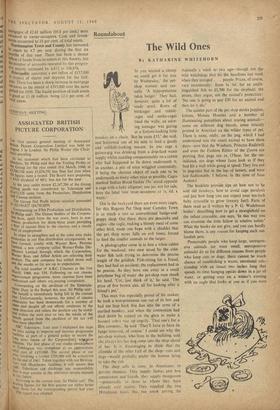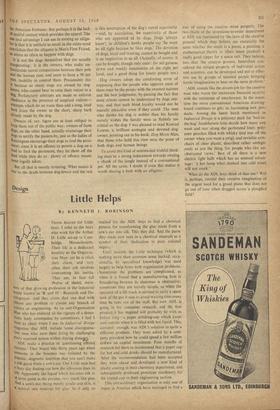Roundabout
The Wild Ones
By KATHARINE WHITEHORN Out in the backyard there are even more cages, for this Regents Pet Shop near Camden Town is as much a zoo as conventional budge-and- puppy shop. Out there, there are peacocks and eagles—the eagle, making a bloody meal of some other bird, made one hope with a shudder that the pet shop never falls on evil times, forced to feed the smaller animals to the larger.
A photographer came in to hire a white rabbit for the weekend; two men stood by the cold- water fish tank trying to determine the precise length of the goldfish. Fish-sitting for a friend, they had had an accident; the replacement had to be precise. As they bore one away in a small polythene bag of water the pet-shop man shook his head, 'Cor, just think of it,' he said. 'The price of five brown ales, all for looking after a friend's pet.'
This man was especially proud of his snakes; he took a non-poisonous one out of its box and had. me leap back five feet into the arms of a startled monkey, and when the commotion had died down he tapped on the glass to make a hooded cobra rear up angrily. 'That one's for a film company.' he said 'They'll have to have its fangs' removed, of course.' I could sec why the
pet-shop woman, who lives in the building, said she always lets her dog come into the shop ahead of her. It is discouraging to think that the clientele of the other half of the shop--cats and dqgs—would probably prefer the human being to take the risk.
The shop sells to zoos; to Americans; to private maniacs. They supply llamas and boa
constrictors and lizards: they supply mongooses —presumably to those to whom they have already sold snakes. They supplied the two Himalayan bears that ran amok among the Aspinalls a week or two ago—though not the wild watchdogs that hit the headlines last week
when they savaged . . people Prices, of course, vary enormously : from is 6d. for an undis- tinguished fish to £1,500 for the elephant; the prices, they argue, are the animal's protection: 'No one is going to pay £30 for an animal and then let it die.'
The quieter part of the pet shop stocks puppies, kittens, Mousie Housies and a number of illuminating pamphlets about rearing animals— some on different dog breeds, some (mainly printed in America) oa the wilder types of pet.
There is none, oddly, on the pug, which I had understood was the smart animal to have these days—now that the Windsors, Princess Radziwill and even the Fashion Editor of the Queen are proving that pugs are in. (These, for the un- initiated, are dogs whose faces look as if they had hit a wall while going at speed. They live not in pug-sties but in the lap of luxury, and were last fashionable, I believe, in the time of Jane Austen.) The booklets provide tips on how not to he sold old monkeys, how to avoid cage paralysis and just how long you can expect your ten-inch baby crocodile to grow (twenty feet). Parts of, them read as if written by a P. G. Wodehouse butler: describing how to get a stranglehold on the infant crocodile, one says, 'In this way you can examine the little fellow in relative safety.' What the books do not give, and you can hardly blame them, is any reason for keeping such out-. landish pets.
Presumably people who keep large, unrespon- sive animals (or even small, unresponsive animals) do so for different reasons from people who keep cats or dogs; there cannot be much chance of establishing a warm, emotional rela- tionship with an insect two inches long that spends its time hanging upside down in a jar of water, or getting cosy on a winter's evening with an eagle that looks at you as if you were the American Embassy. But perhaps it is the lack of soulful contact which provides the appeal. The one real advantage I can see in owning an alliga- tor is that it is unlikely to result in the misty-eyed conviction that the alligator is Man's First Friend, its seems so often to happen with dogs.
It is not the dogs themselves that are usually exasperating: it is the owners, who make un- favourable moral comparisons between their pets and the human race, and seem to have a 90 per cent. inability to control them. Presumably this 18 because so many dogs are owned by dog- lovers, who cannot bear to raise their voices to a dog. Perfunctory attempts are made to enforce obedience in the presence of sceptical visitors— attempts which do no more than add a long, loud hark from the owner to the short, sharp bark already made by the dog.
Owners of, say, tigers are at least obliged to keep them out of the public way; owners of farm dogs, on the other hand, actually encourage their dogs to terrify the passers-by, just as the ladies of Kensington encourage their dogs to foul the pave- ment; since it is an offence to permit a dog on a lead to foul the pavement, they let them off the lead while they do so : plenty of offence meant, hone legally taken.
Rut all that is merely irritating. What makes it oar to the death between dog-lovers and the rest is this assumption of the dog's moral superiority —and, by association, the superiority of those who are approved of by dogs. Dogs 'always know'; in children's books people say 'he must be all right because he likes dogs.' The devotion of dogs, loyal and trusting, cannot be bought and is an inspiration to us all. (Actually, of course, it can be bought, though only once: for ten guineas down and weekly instalments of the right pet food; and a good thing for lonely people too.) Dog owners adopt the comforting error of supposing that the people who approve most of them must be the people with the sweetest natures and the best judgments; by-passing the fact that most crimes cannot be understood by dogs any- way, and that such blind loyalty would not be morally attractive even if they could. The man who thinks his dog is nobler than his family merely wishes the family were as flabbily un- critical as the dog. 1 was pleased to read Konrad Lorenz, a brilliant ecologist and devoted dog- owner, pointing out in his book, Dog Meets Man, that those who hold this view miss the point of both dogs and human beings.
To avoid this kind of sentimental wishful think- ing must be a strong inducement towards owning a chunk of the jungle instead of a conventional pet. All the same, I doubt if even this makes it worth sharing a bath with an alligator.



































 Previous page
Previous page